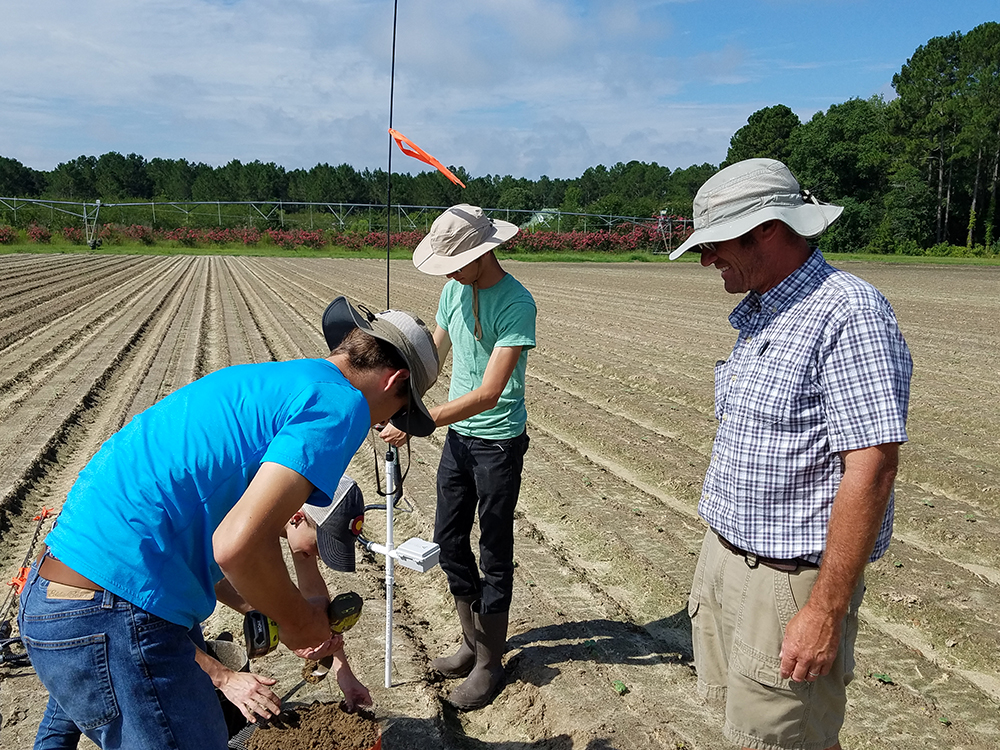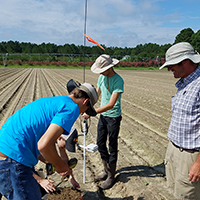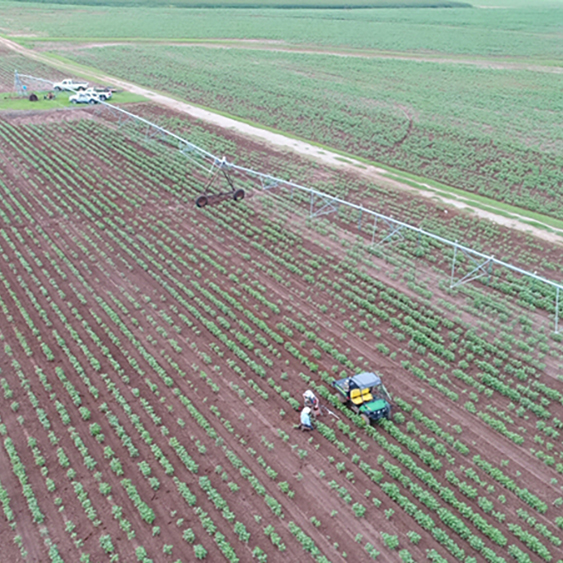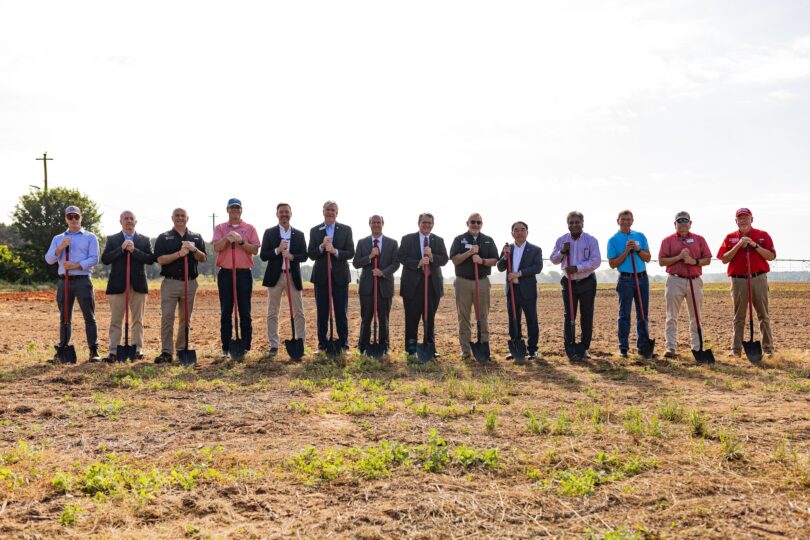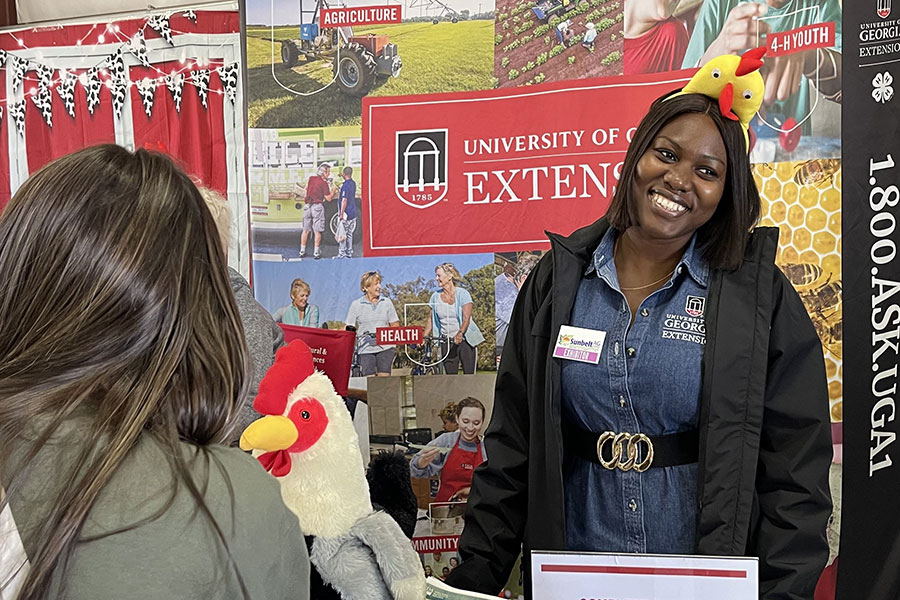As part of an irrigation efficiency study by University of Georgia Cooperative Extension, a 29-person team of social scientists, agricultural economists, climatologists, agricultural engineers and UGA Extension agents from the UGA College of Agricultural and Environmental Sciences is studying agricultural irrigation in order to increase the water-use efficiency in row crops common to southern Georgia.
Laura Perry Johnson, associate dean for UGA Extension, started the project in response to a report issued during the Georgia-Florida water wars, a legal dispute over water from the Chattahoochee and Flint rivers. During the trial, Georgia was criticized for agricultural water use that, according to the report, had remained largely unchecked, Johnson said.
“We’re working all the time to be more efficient and effective with our water use,” Johnson said. “(We’d) like to be able to show that we have promoted the adoption of technology and that we can document a decrease in agricultural water usage or at least obtain a higher (water use) efficiency with our water usage.”
The team consists of 13 Agriculture and Natural Resources (ANR) agents from Extension’s Southeast and Southwest districts. This year, each agent identified two local cotton farmers who they felt were progressive and willing to adopt technology. Three soil water-tension probes, each with three sensors, were installed in each of those farmers’ fields. The farmers irrigated using data from the probes, and they verified the information provided by an irrigation-scheduling smartphone app developed by team member and UGA precision agriculture expert George Vellidis.
“We have to increase production with equal or less water. We feel like you can do that by adopting technology that helps you better schedule your irrigation,” said Calvin Perry, team coordinator and superintendent of UGA’s C.M. Stripling Irrigation Research Park in Camilla, Georgia. “We’ve seen through research that, over a growing season, when you apply water is often as important or more important than how much water you apply. You can potentially increase yields and quality with the same amount of water if you put it on at those critical times.”
This project allows for irrigation experts like Vellidis, Perry and Assistant Professor Wes Porter to familiarize county agents and farmers with Vellidis’ SmartIrrigation Cotton App and soil moisture sensors in an effort to increase adoption rates of these water-conserving tools.
“The (Cotton App) consistently increases both water use efficiency and cotton yield over a standard ‘checkbook’ practice, both in wet and dry years,” Porter said. “This project is pivotal in leading an effort at advancing irrigation scheduling tools and technology adoption on farms across our state.”
Johnson enlisted the help of Abigail Borron and Jessica Holt, assistant professors in the college’s agricultural leadership, education and communication department, to measure and understand producer and agent perceptions and behaviors associated with technology adoption. They are studying certain ideas, attitudes and beliefs to provide producers with water-use information, training and technology in the future. Agricultural economists Adam Rabinowitz and Amanda Smith are examining the economics behind the implementation of these irrigation efficiency practices, including costs and producer behavior. Gary Hawkins, a UGA Extension specialist in water resource management and policy, is working with Extension 4-H specialist Melanie Biersmith and agricultural climatologist Pam Knox to share the knowledge gained from this research with policymakers, Georgia residents and youth.
“Extending the knowledge gained on the farm to these other citizens helps spread the word that farmers are working to better manage water resources to produce the food and fiber we use and consume daily,” Hawkins said.
Ian Flitcroft, who manages the UGA Weather Network, and Extension ANR Program Development Coordinators Bobby Smith (Northeast District), Jule-Lynne Macie (Northwest District), Wade Parker (Southeast District) and Scott Utley (Southwest District) are part of the team.
“Putting too much water on the crops does not help and can reduce water availability for other people,” Knox said. “Our project on the use of smart irrigation techniques that includes the monitoring of soil moisture will help make sure there is enough water available for everyone.”
For more information on water conservation, visit caes.uga.edu/about/hot-topics/water.html.

